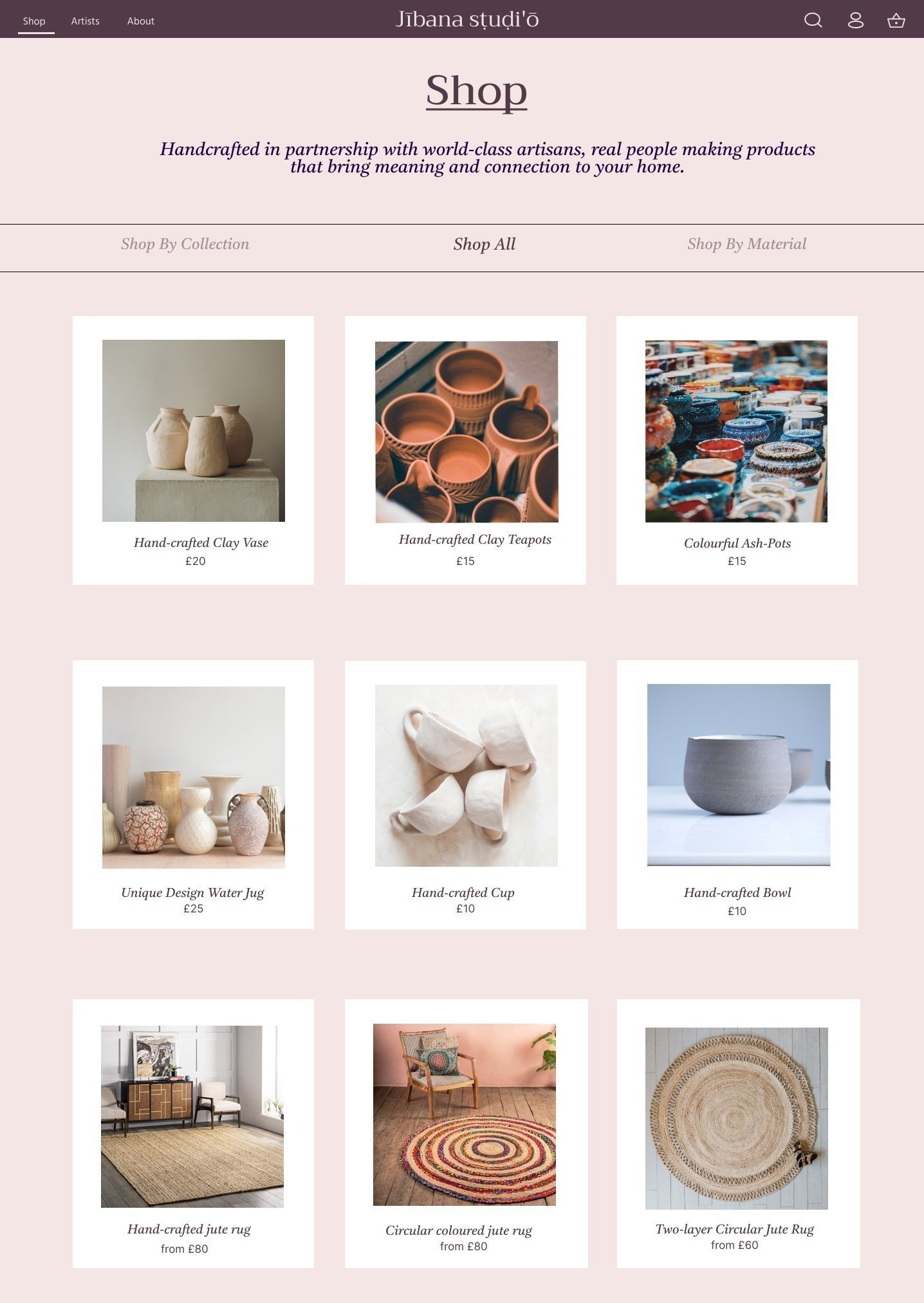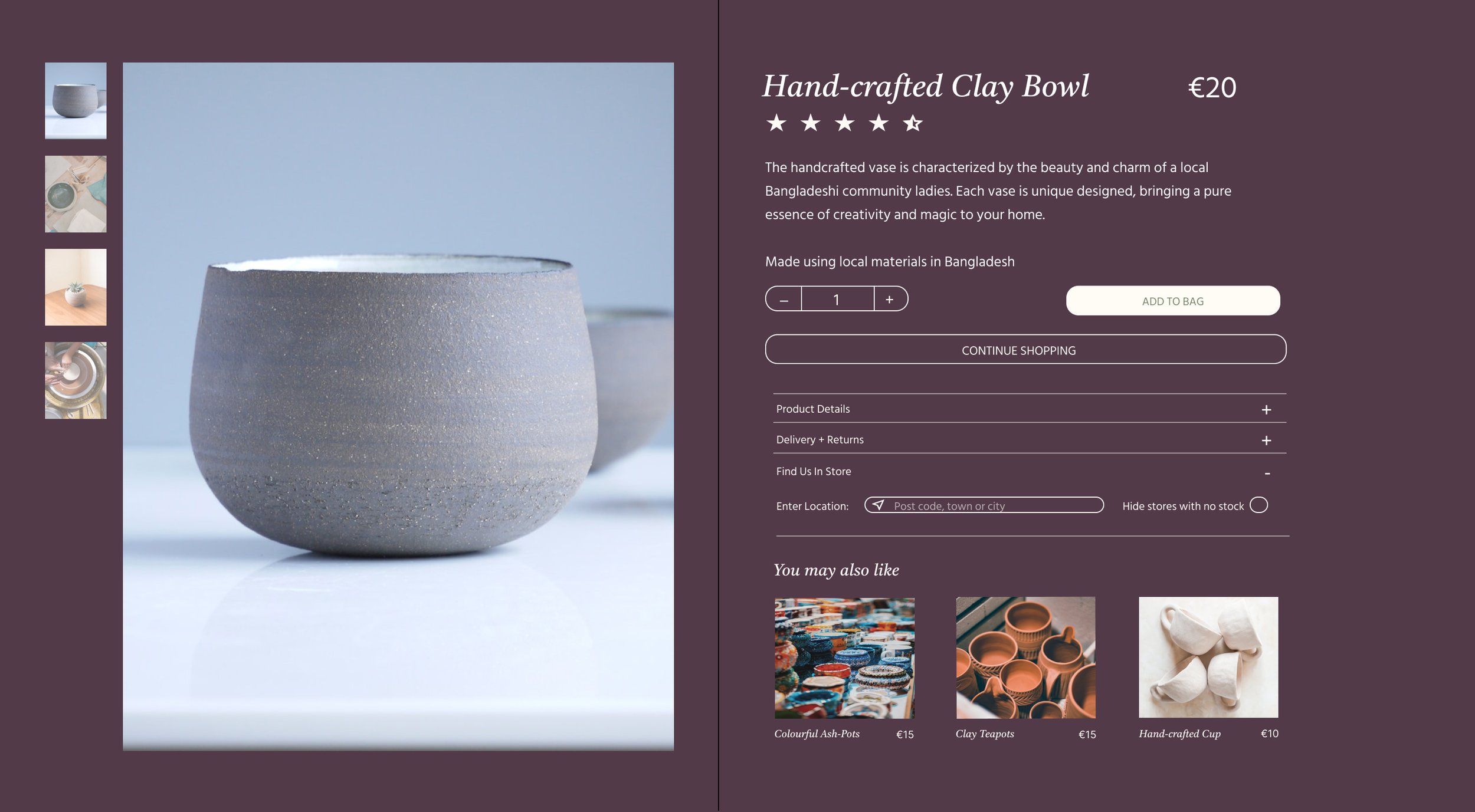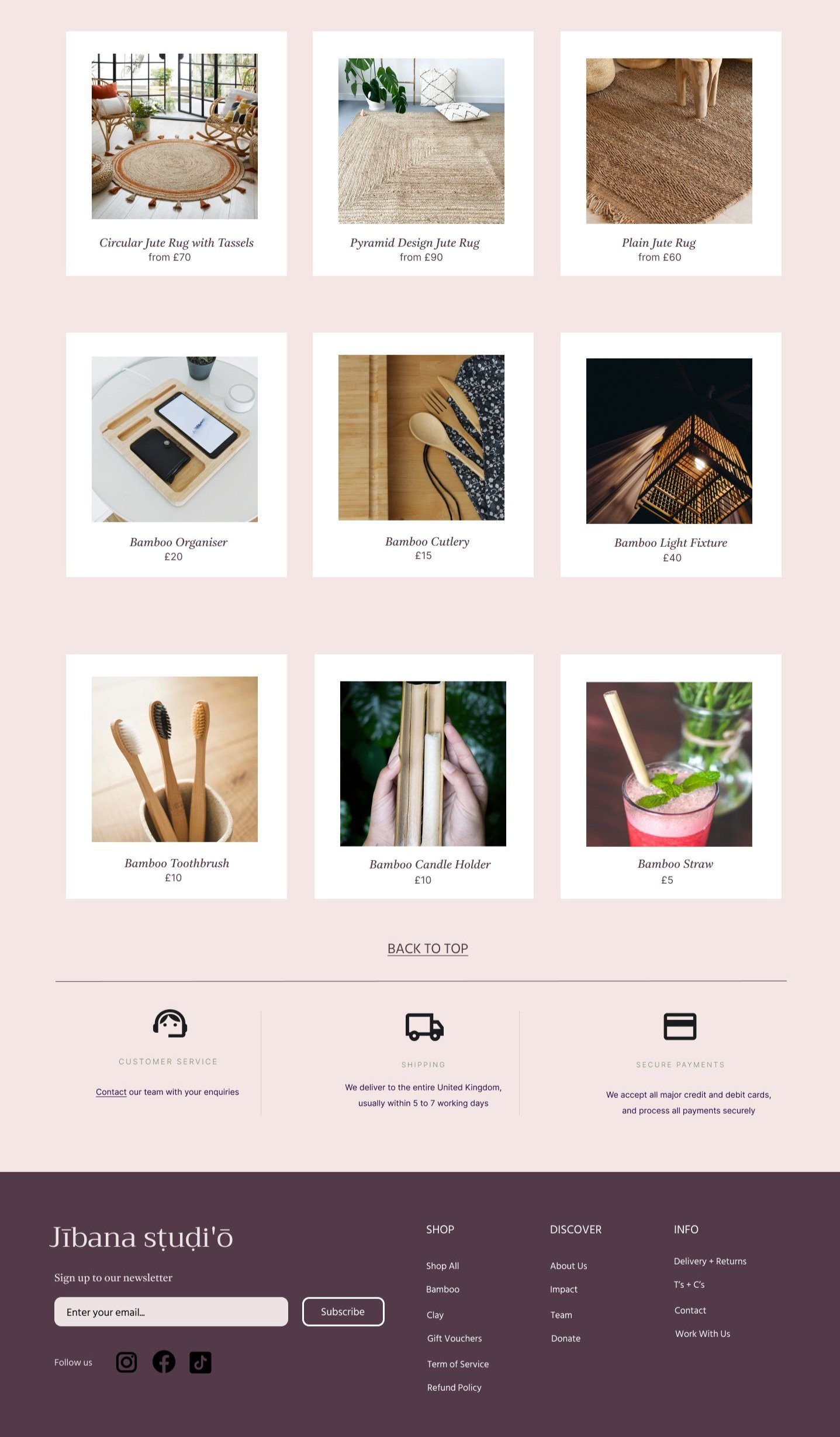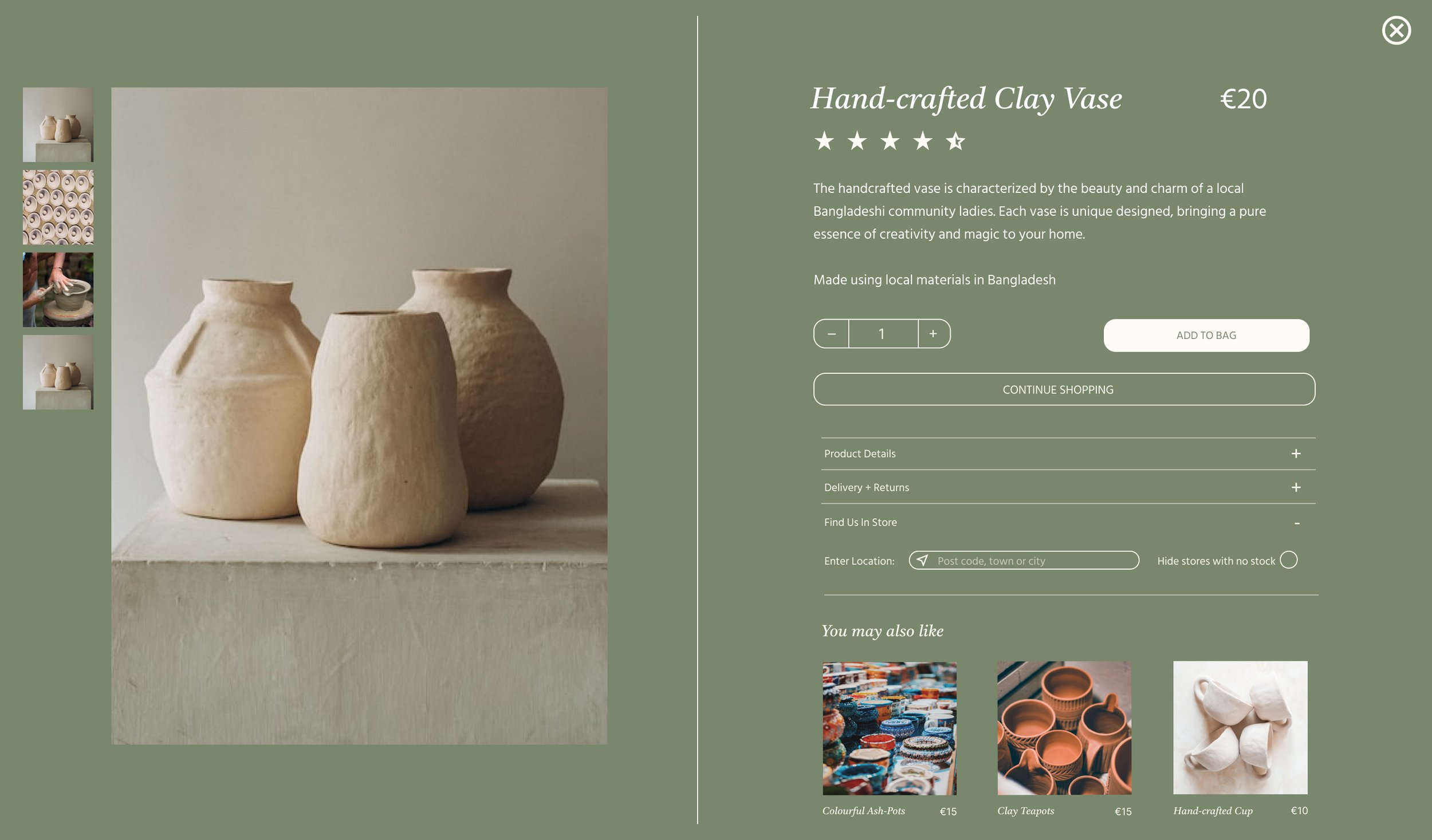
Jībana Sṭuḍi'ō
Shop with purpose, build a better future
My Role
In early 2023 I enrolled in the UX and UI Design course by Experience Haus. Over the duration of the 10 weeks, we were taught the basics and fundamentals before working on a project for a real-world client.
I collaborated with two others on our team project for Azuko, equally dividing the workload for all areas of research and design.
THE CHALLENGE
Setting the scene
Azuko is an architecture charity that aims to alleviate poverty through sustainable development. They work alongside disadvantaged communities in the UK and Bangladesh to improve living conditions.
For their latest project, they’ve chosen to launch an online marketplace to sell products made from sustainable materials, created by the women who live in these communities, to support the women in these communities.
The profits are then reinvested to train these women in design and construction, so that they can build and improve their homes.

DISCOVERY
It is estimated that 3 billion people, about 40% of the world’s population, will need help to access adequate housing
In Bangladesh, an estimated 35 million people are living below the poverty line

Women spend about three times as many hours on unpaid domestic work and care work as men per day.
Why Women?
Typically, women in rural Bangladesh manage their homestead while men work away.
A bit about Azuko
Azuko trained 260 women to build for safety in 2022, and aim to train 1000-plus over the next three years.
39% of women trained have implemented at least one improved building technique within three months.
THE APPROACH
Create opportunities to connect with customers that seek to support socially responsible brands
The goal is to create a dedicated online marketplace designed to celebrate the artisans, promote their stories, and highlight the high-quality and ethical features of their products. By doing this, we will help Azuko generate awareness, secure funding, and mobilise resources to effectively combat housing poverty and improve living conditions for vulnerable communities.
REQUIREMENTS
Community-driven reviews
that build trust and form connections.
High-quality, ethical products
with transparency surrounding sourcing, production processes, and materials used.
Curated artisan profiles
that include their background, inspirations, and craftsmanship.
Social responsibility metrics
that allow customers to understand how their support positively affects poverty alleviation and community development.
THE DISCOVERY
Key findings from The UK
-
Product quality is the most important factor, followed by price.
-
Users would be hesitant to buy from overseas if the delivery time takes too long.
They would like a brand to have an online presence outside of the website.
There has been a big increase in ordering online via websites or apps in the recent years, but they also still shop in store.
-
They believe something with a higher price point should be a unique piece and preferably made from sustainable, ethically-sourced materials.
If purchasing a unique product, they would be interested in knowing the level of skill of the maker and their background or story.
If purchasing from a social-good platform, they would want to know the impact of their purchase.
“I’d spend more if its handmade or one of a kind.”
Key findings from Bangladesh
-
Product quality is the most important factor, followed by price.
-
Prefer to buy their products locally as they like to check the quality of the product in person.
Hesitant to buy online due to fear of being scammed and receiving low-quality products.
If they do buy online, it tends to be through Facebook because they can check the reviews and see the products in-person before finalising a purchase.
-
They often buy certain products from specific communities because they are well known for a particular skill set.
They tend to buy products made from sustainable materials such as bamboo and clay.
They often find hand-made products too expensive.
“Sites here are untrustworthy, so reviews mean alot.”
“ How often do you purchase from a social-good store?”
“Are you a member of any charities?”
Defining the personas
Chloe
22 Student Bristol £10 p/h
-
Social media user, heavily influenced by latest fashion trends
Likes to browse through marketplaces and fashion apps in her free time
Shops almost entirely online
Shops with a budget in mind
-
Finds eco-friendly and sustainable products are often too expensive
Doesn’t have enough disposable income to support charities as much as she’d like to
Doesn’t like to wait longer than a day for delivery
-
To be able to support a good cause while shopping rather than signing up to a charity
To be able to shop for quality, sustainable products without sacrificing an affordable price point
Speedy and cheap delivery
Sara
37 Professional London £50k p/a
“If I learn about a social cause that I want to support, I will fabricate a need for a product from their business.”
-
Lives an eco-friendly and sustainable lifestyle
Is always recycling, reusing, and reducing waste
Shops mostly for second-hand items
Regularly donates to causes and supports multiple charities
-
Dislikes large companies and won’t shop for anything that’s mass produced
Finds cheap items are often made with terrible quality
-
To be able to purchase from a social-good platform without sacrificing product quality
To be updated on the progress of the charities she supports
To be able to find all the information necessary to ensure that she is making an ethical purchase
Mohammed
26 Student Dhaka BTD p/m
“I realise the value of purchasing local products, and I want to help my community as much as possible”
-
Likes to browse online, but almost always purchases in store to ensure good quality
Likes to buy/sell/work with his local communities
Tends to purchase low-cost, traditional products from locals
-
Finds online stores untrustworthy and has to travel to purchase in store to avoid knock offs
Doesn’t like buying cheaply made products from overseas, wishes to support his community
-
To connect with his community and support locally
Interested in locally sourced bamboo products
Trustworthy online presence with great reviews as proof
Sussing out the competition
THE VISION
Building a sustainable marketplace, and a future for the artisans
Giving talented, underprivileged artists a platform to showcase their skill and craftsmanship, and raising awareness of the living conditions in Bangladesh. The profits then go to training these women to improve their housing and strengthen their communities.
PLAN AND PREPARE
Early design
Colour
Neutrals and earthy tones to represent raw, natural, sustainable materials
Accent colours of olive green for nature and terracotta orange for clay and mud
High contrast for accessibility for users with vision impairments
Structure and tone
Line dividers throughout the pages to represent architecture and structure, tying it to its sister company, AzuKo
Minimal, sophisticated and high-end
Font
Use fonts that are available in the UK and Bangladesh
Sitemap
We created a sitemap to improve website navigation for users, enhance search engine optimization (SEO) by aiding in efficient indexing, and ensure a well-structured and organised website that benefits both visitors and search engines.
Some of the key focuses for us included:
Product categories
Impact stories
Educational content
Donations and subscribers
Accessibility and easy navigation
Framework
Through user research, we found that there were three main elements that needed to be showcased for the user to connect with the brand. These became the focal points during the wireframing stages.
Experimenting with layout and structure
Focusing on:
Information hierarchy
Not overloading the user with information
Make it eye catching
Clear navigation
Keep it classy
REVIEW AND REFINE
USER TESTING
Clear navigation
Users felt lost when navigating as they didn’t have an indication of where they were. To make this clearer, we highlighted the page that the user is currently on.
The learn more button initially only appeared once the mouse hovered over the image. Feedback highlighted that users were worried they would miss this feature, so we changed it to a permanent link below the image.
More selection
As requested from the feedback, more products were added per row to speed up the shopping experience.
We added a shop by categories button for the user to personalise their experience.
We also added a shop by collection feature also enables us to have a landing page if the user journey has come from the Artists page.
More photos and suggested products
Once the first prototype was almost complete, I went back to the interview notes we had taken at the start to see if we were missing any key elements. Almost all of our interviewees said that multiple images of a product were important for them to create trust with both the product and the brand, so we added these in.
We also opted for a you may also like carousel to encourage the user to keep browsing and to create a better experience.

Final designs
Homepage
A high-end website that everyone can trust
The key elements
‘New in’ feature
Highlight selling point
‘Do good’ emphasis
Show the quality
Trustworthy and reliable
About Jibana
Meet the artists
Evoking empathy and forming trust
User groups in the UK and Bangladesh reported not wanting to purchase if a website does not seem trustworthy.
Connecting with customers
By featuring real-life stories, we are creating the interest for customers to help. This results in not only sales, but returning customers as well.
Highlighting materials and sustainability
Research with our Bangladesh users in particular displayed that knowing that the materials are sustainably sourced from local areas is a key factor in deciding if they will make a purchase.
Product page










































